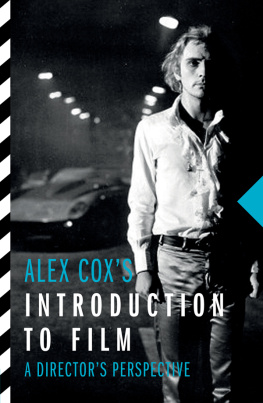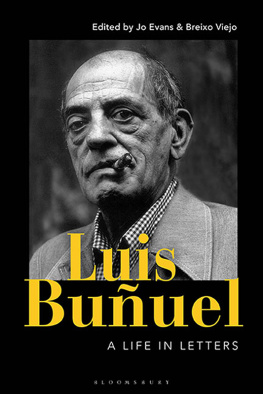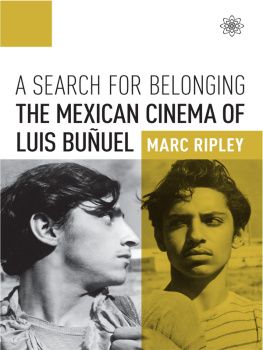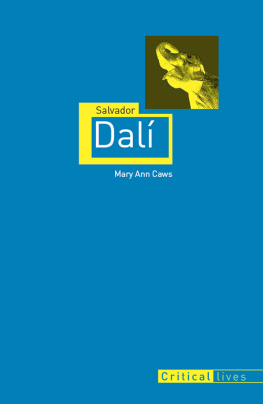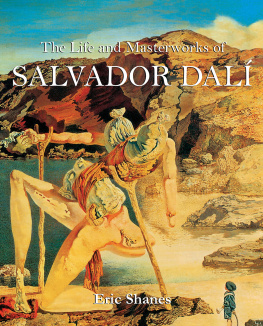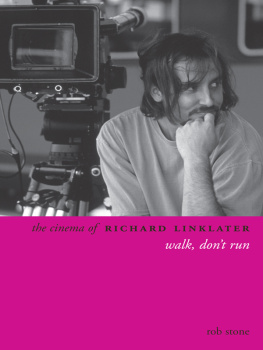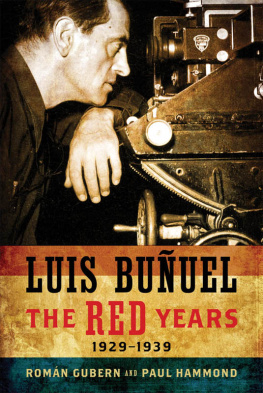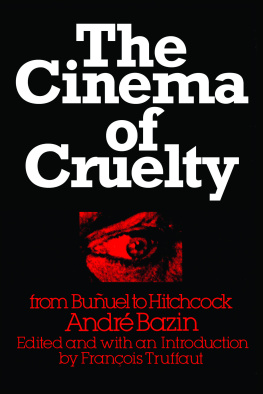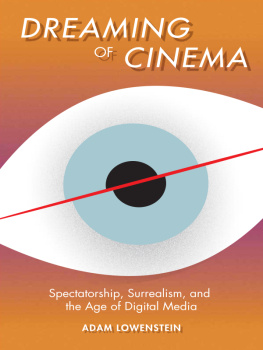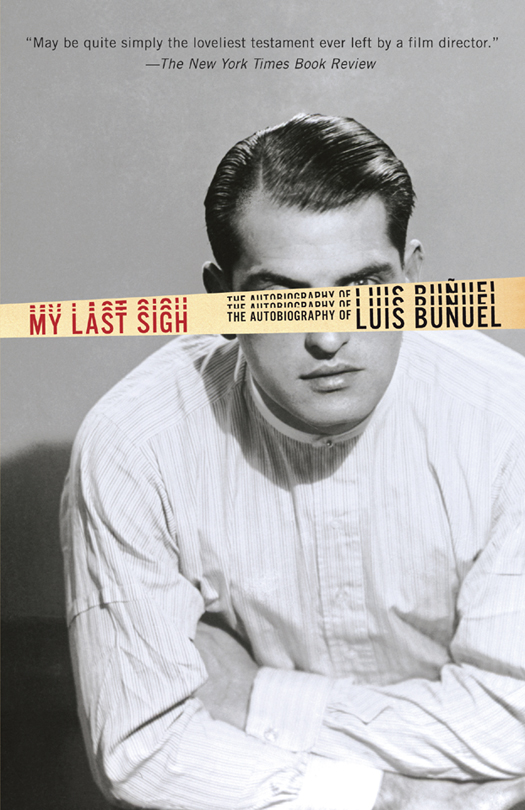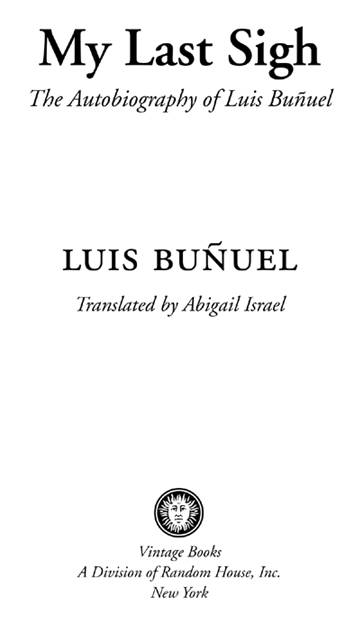Luis Buuel (19001983) was one of the twentieth centurys greatest filmmakers. His many credits include Un Chien Andalou (1924), which he conceived with Salvador Dal, and The Discreet Charm of the Bourgeoisie (1972), which won the Academy Award for Best Foreign Film.
T HE F ILMS OF L UIS B UUEL
Un Chien andalou 1928
LAge dor 1930
Trerra sin pan 1932
En el viejo Tampico 1947
El gran calavera 1949
Los olvidados (The Young and the Damned) 1950
The Devil and the Flesh 1951
Daughter of Deceit 1951
Una mujer sin amor 1951
Mexican Bus Ride 1951
The Brute 1952
The Adventures of Robinson Crusoe 1952
El (This Strange Passion) 1952
Wuthering Heights 1953
Illusion Travels by Streetcar 1953
Death and the River 1954
The Criminal Life of Archibaldo de la Cruz 1955
Cela sappelle laurore 1956
Death in the Garden 1956
Nazarin 1959
La Fivre monte El Pao 1960
The Young One 1960
Viridiana 1961
The Exterminating Angel 1962
Diary of a Chambermaid 1964
Simon of the Desert 1965
Belle de jour 1967
The Milky Way 1969
Tristana 1970
The Discreet Charm of the Bourgeoisie 1972
The Phantom of Liberty 1974
That Obscure Object of Desire 1977
FIRST VINTAGE BOOKS EDITION, MARCH 2013
Translation copyright 1983 by Alfred A. Knopf
All rights reserved. Published in the United States by Vintage Books, a division of Random House, Inc., New York, and in Canada by Random House of Canada Limited, Toronto. Originally published in France as Mon dernier soupir by Editions Robert Laffont, Paris, in 1982. This translation originally published in hardcover in the United States by Alfred A. Knopf, a division of Random House, Inc., New York, in 1983.
Vintage and colophon are registered trademarks of Random House, Inc.
Photograph credits: Archive of Georges Sadoul: .
The Library of Congress has cataloged the Knopf edition as follows:
Buuel, Luis.
My last sigh:the autobiography of Luis Buuel / Luis Buuel, translated by
Abigail Israel
p. cm.
Translation of Mon dernier soupir.
1. Buuel, Luis. 2. Moving-picture producers and directorsSpainBiography.
I. Title.
PN1998.A3B7413 1983
791.4302330924 83-48105
eISBN: 978-0-345-80371-9
www.vintagebooks.com
Cover design: John Gall
Cover photograph: Luis Buuel, 1929, Man Ray Trust/ ADAGP-ARS/Telimage, 2012
Artwork: 2012 Man Ray Trust / Artist Rights Society (ARS), NY/ADAGP, Paris
v3.1
To Jeanne my wife, my companion
Im not a writer, but my friend and colleague Jean-Claude
Carrire is. An attentive listener and scrupulous recorder during
our many long conversations, he helped me write this book.
Contents
1
Memory
DURING the last ten years of her life, my mother gradually lost her memory. When I went to see her in Saragossa, where she lived with my brothers, I watched the way she read magazines, turning the pages carefully, one by one, from the first to the last. When she finished, Id take the magazine from her, then give it back, only to see her leaf through it again, slowly, page by page.
She was in perfect physical health and remarkably agile for her age, but in the end she no longer recognized her children. She didnt know who we were, or who she was. Id walk into her room, kiss her, sit with her awhile. Sometimes Id leave, then turn around and walk back in again. She greeted me with the same smile and invited me to sit downas if she were seeing me for the first time. She didnt remember my name.
When I was a schoolboy in Saragossa, I knew the names of all the Visigoth kings of Spain by heart, as well as the areas and populations of each country in Europe. In fact, I was a goldmine of useless facts. These mechanical pyrotechnics were the object of countless jokes; students who were particularly good at it were called memoriones. Virtuoso memorin that I was, I too had nothing but contempt for such pedestrian exercises.
Now, of course, Im not so scornful. As time goes by, we dont give a second thought to all the memories we so unconsciously accumulate, until suddenly, one day, we cant think of the name of a good friend or a relative. Its simply gone; weve forgotten it. In vain, we struggle furiously to think of a commonplace word. Its on the tip of our tongues but refuses to go any farther.
Once this happens, there are other lapses, and only then do we understand, and acknowledge, the importance of memory. This sort of amnesia came upon me first as I neared seventy. It started with proper names, and with the immediate past. Where did I put my lighter? (I had it in my hand just five minutes ago!) What did I want to say when I started this sentence? All too soon, the amnesia spreads, covering events that happened a few months or years agothe name of that hotel I stayed at in Madrid in May 1980, the title of a book I was so excited about six months ago. I search and search, but its always futile, and I can only wait for the final amnesia, the one that can erase an entire life, as it did my mothers.
So far, Ive managed to keep this final darkness at bay. From my distant past, I can still conjure up countless names and faces; and when I forget one, I remain calm. I know its sure to surface suddenly, via one of those accidents of the unconscious. On the other hand, Im overwhelmed by anxiety when I cant remember a recent event, or the name of someone Ive met during the last few months, or the name of a familiar object. I feel as if my whole personality has suddenly disintegrated; I become obsessed; I cant think about anything else; and yet all my efforts and my rage get me nowhere. Am I going to disappear altogether? The obligation to find a metaphor to describe table is a monstrous feeling, but I console myself with the fact that there is something even worseto be alive and yet not recognize yourself, not know anymore who you are.
You have to begin to lose your memory, if only in bits and pieces, to realize that memory is what makes our lives. Life without memory is no life at all, just as an intelligence without the possibility of expression is not really an intelligence. Our memory is our coherence, our reason, our feeling, even our action. Without it, we are nothing.
Imagine (as I often have) a scene in a film where a man tries to tell a friend a story but forgets one word out of four, a simple word like car or street or policeman. He stammers, hesitates, waves his hands in the air, gropes for synonyms. Finally, his friend gets so annoyed that he slaps him and walks away. Sometimes, too, resorting to humor to ward off panic, I tell the story about the man who goes to see a psychiatrist, complaining of lapses in memory. The psychiatrist asks him a couple of routine questions, and then says:
So? These lapses?
What lapses? the man replies.
Memory may be omnipotent and indispensable, but its also terribly fragile. The menace is everywhere, not only from its traditional enemy, forgetfulness, but from false memories, like my often repeated story about Paul Nizans wedding in the 1930s. The Church of St.-Germain-des-Prs, where he was married, is crystal clear in my minds eye. I can see the congregation, myself among them, the altar, the priesteven Jean-Paul Sartre, the best man. And then suddenly, one day last year, I said to myselfbut thats impossible! Nizan, a militant Marxist, and his wife, who came from a family of agnostics, would never have been married in a church! It was categorically unthinkable. Did I make it up? Confuse it with other weddings? Did I graft a church I know well onto a story that someone told me? Even today, Ive no idea what the truth is, or what I did with it.


